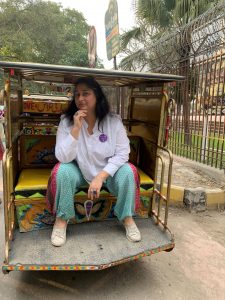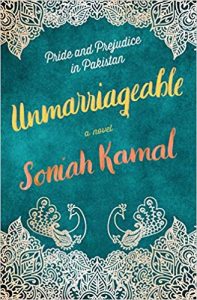When Tourists Come Home
 Children do not get to pick the cities they are brought up in. They arrive as strangers and are responsible for making themselves at home. But what makes a city home? In the late 1980s my family returned to Lahore, Pakistan from Saudi Arabia and our status changed from that of summer tourists simply looking forward to activities planned by relatives. Now we were residents. As tourists we’d visit Main Market just for freshly squeezed juices. As residents, we walked down dusty stairs to a pokey little shop that could rival any shoppe in Harry Potter’s world to purchase school uniforms. Instead of tourists driving past Pioneer General Store, we now entered the single aisled grocery with a long list in hand.
Children do not get to pick the cities they are brought up in. They arrive as strangers and are responsible for making themselves at home. But what makes a city home? In the late 1980s my family returned to Lahore, Pakistan from Saudi Arabia and our status changed from that of summer tourists simply looking forward to activities planned by relatives. Now we were residents. As tourists we’d visit Main Market just for freshly squeezed juices. As residents, we walked down dusty stairs to a pokey little shop that could rival any shoppe in Harry Potter’s world to purchase school uniforms. Instead of tourists driving past Pioneer General Store, we now entered the single aisled grocery with a long list in hand.
Living here, I learned how to stand safely in front of open air vegetables stalls, always situated at the edges of dusty conveyance congested roads, and haggle in my broken Urdu with vendors who’d toss a few free green chillies or paper lemons into my bag. There was commerce here, but also generosity.
Long drives to landmarks are a tourist staple and every summer we would be taken to Mall Road, tree lined, constructed during the British Empire and wide enough for horse drawn carriages. The British had named it after The Mall in London which connects Buckingham Palace with Trafalgar Square. As tourists we’d whiz past places like the High Court, The Lahore Museum, The Post Office, (to me, just British red brick buildings) or stop at the Lahore Zoo, begun in the 1860s and one of the oldest zoos in the world.
However, once we started living in Lahore, our Mall was just another road we took to get to Anarkali Bazaar or Ferozsons Bookstore or Data Darbar, a sufi saint’s shine. A city becomes home then when you stop sightseeing and take others instead.
Many cities in Pakistan also become home to Alys Binat, the protagonist in my novel Unmarriageable a parallel retelling of Jane Austen’s classic novel, Pride and Prejudice, and set in contemporary Pakistan which I wrote because 1) Pride and Prejudice resonates with me deeply, 2) growing up there was no stories written in English and set in Pakistan and 3) Pakistani society resembles Regency England’s in its emotional makeup, its morals, manners and attention to social hierarchy and I wanted to use that as a bride to explore the universalities in literature across centuries. In Jane Austen’s Pride and Prejudice, the Bennets live in the village of Meryton and so, in my novel, Unmarriageable: Pride and Prejudice in Pakistan, I created the fictitious small town of Dilipabad. Like me, my Binat sisters are also third culture children who have spent their formative years in Saudi Arabia and are returning to Lahore.
Alys Binat, my Elizabeth Bennet, has a difficult time adjusting to the move though she eventually finds her way around town. She has chai at the legendary Pak Tea House with a gossiping Mr. Wickaam. She goes with him to Wagah Border between Pakistan and India to see the changing of guard performance. A runner, she frequents public parks. Alys also realizes that, to be at home in a place and not a just a tourist, is to have peopled its buildings and, during a drive on Mall Road, she makes a mental note of all the associations she’s grown to have with the brick and mortar surrounding her:
“Up ahead on the Mall Road, closer to the Simla Hill, was The Convent of Jesus and Mary, the school Alys and Jena had attended before leaving for Jeddah. There was the National College of Arts where Aunty Nona had studied. And King Edward Medical College where Aunty Nona’s brother and Uncle Nisar had studied. And Aitchison College where Darsee and Bungles had been classmates. Further up at the American School and the British Council, Alys had attended plays and lectures.”
These details got cut out of Unmarriageable and now live on the editing floor. However, there remains a drive down the Mall in the novel. So it is with memory and places—you move but they live in you.
When I left Lahore for college in the U.S., I did not know at the time that I would never be back permanently, that I would become just a visitor in what was once my home. Lahore for me is nostalgia and deep roots, even though I have no address of my own. When I think of Lahore, I see a post-midnight return from a big fat wedding, our car creeping through dense fog, the howling of stray dogs, a promise of reaching my house, my bedroom bathed in the fierce orange glow of electric rods from heaters burning bright, and me snuggling under colorful quilts that will keep me warm. What makes a city home? Memories, surely.
—
Soniah Kamal is an award winning essayist and fiction writer. Her novel Unmarriageable: Pride & Prejudice in Pakistan‘, a parallel retelling of Pride and Prejudice and set in contemporary Pakistan,. NPR calls it ‘thought provoking and deliciously readable’ and Unmarriageable is an Amazon Best Books pick, a People Magazine’s Pick, a Library Reads pick and more. Soniah’s debut novel An Isolated Incident was a finalist for the Townsend Award for Fiction and the KLF French Fiction Prize. Soniah‘s TEDx talk is about regrets and redemption. Her work has appeared in The New York Times, The Guardian, Buzzfeed, Catapult, The Normal School, Literary Hub, and has been widely anthologized. Soniah was born in Pakistan, grew up in England and Saudi Arabia, and currently resides in Georgia. www.soniahkamal.com
 “This inventive retelling of Pride and Prejudice charms.”—People
“This inventive retelling of Pride and Prejudice charms.”—People
“A fun, page-turning romp and a thought-provoking look at the class-obsessed strata of Pakistani society.”—NPR
Alys Binat has sworn never to marry—until an encounter with one Mr. Darsee at a wedding makes her reconsider.
A scandal and vicious rumor concerning the Binat family have destroyed their fortune and prospects for desirable marriages, but Alys, the second and most practical of the five Binat daughters, has found happiness teaching English literature to schoolgirls. Knowing that many of her students won’t make it to graduation before dropping out to marry and have children, Alys teaches them about Jane Austen and her other literary heroes and hopes to inspire the girls to dream of more.
When an invitation arrives to the biggest wedding their small town has seen in years, Mrs. Binat, certain that their luck is about to change, excitedly sets to work preparing her daughters to fish for rich, eligible bachelors. On the first night of the festivities, Alys’s lovely older sister, Jena, catches the eye of Fahad “Bungles” Bingla, the wildly successful—and single—entrepreneur. But Bungles’s friend Valentine Darsee is clearly unimpressed by the Binat family. Alys accidentally overhears his unflattering assessment of her and quickly dismisses him and his snobbish ways. As the days of lavish wedding parties unfold, the Binats wait breathlessly to see if Jena will land a proposal—and Alys begins to realize that Darsee’s brusque manner may be hiding a very different man from the one she saw at first glance.
Told with wry wit and colorful prose, Unmarriageable is a charming update on Jane Austen’s beloved novel and an exhilarating exploration of love, marriage, class, and sisterhood.
Praise for Unmarriageable
“Delightful . . . Unmarriageable introduces readers to a rich Muslim culture. . . . [Kamal] observes family dramas with a satiric eye and treats readers to sparkling descriptions of a days-long wedding ceremony, with its high-fashion pageantry and higher social stakes.”—Star Tribune
“Thoroughly charming.”—New York Post
“[A] funny, sometimes romantic, often thought-provoking glimpse into Pakistani culture, one which adroitly illustrates the double standards women face when navigating sex, love, and marriage. This is a must-read for devout Austenites.”—Publishers Weekly (starred review)
Category: Contemporary Women Writers, On Writing
























Comments (1)
Trackback URL | Comments RSS Feed
Sites That Link to this Post